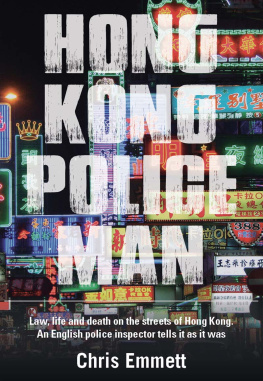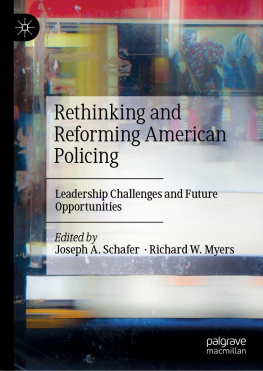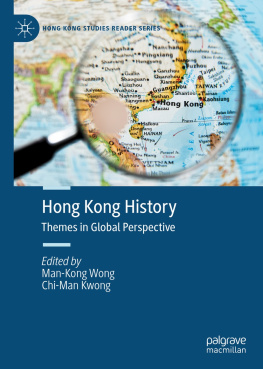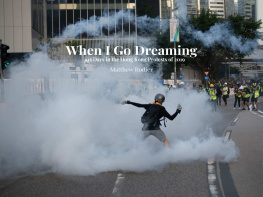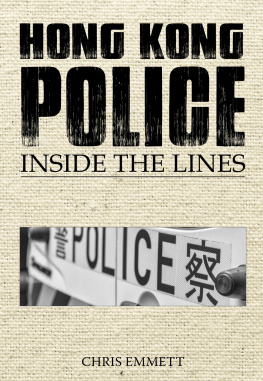POLICING IN HONG KONG
INTERNATIONAL AND COMPARATIVE CRIMINAL JUSTICE
Series Editors:
Mark Findlay, Institute of Criminology, University of Sydney, Australia Ralph henham, Nottingham Law School, Nottingham Trent University, UK
This series explores the new and rapidly developing field of international and comparative criminal justice and engages with its most important emerging themes and debates. It focuses on three interrelated aspects of scholarship which go to the root of understanding the nature and significance of international criminal justice in the broader context of globalization and global governance. These include: the theoretical and methodological problems posed by the development of international and comparative criminal justice; comparative contextual analysis; the reciprocal relationship between comparative and international criminal justice and contributions which endeavor to build understandings of global justice on foundations of comparative contextual analysis.
Other titles in the series:
Criminal Law Reform and Transitional Justice
Human Rights Perspectives for Sudan
Edited by Lutz Oette
ISBN 978 1 4094 3100 8
Codification, Macaulay and the Indian Penal Code
The Legacies and Modern Challenges of Criminal Law Reform
Edited by Wing-cheong chan, Barry Wright and Stanley Yeo
ISBN 978 1 4094 2442 0
Exploring the Boundaries of International Criminal Justice
Edited by Ralph henham and Mark Findlay
ISBN 978 0 7546 4979 3
The International Criminal Court and National Courts
A Contentious Relationship
Nidal Nabil Jurdi
ISBN 978 1 4094 0916 8
Policing in Hong Kong
KAM C. WONG
Xavier University, Cincinnati, USA

First published 2012 by Ashgate Publishing
Published 2016 by Routledge
2 Park Square, Milton Park, Abingdon, Oxon OX14 4RN
711 Third Avenue, New York, NY 10017, USA
Routledge is an imprint of the Taylor & Francis Group, an informa business
Copyright Kam C. Wong 2012
Kam C. Wong has asserted his right under the Copyright, Designs and Patents Act, 1988, to be identified as the author of this work.
All rights reserved. No part of this book may be reprinted or reproduced or utilised in any form or by any electronic, mechanical, or other means, now known or hereafter invented, including photocopying and recording, or in any information storage or retrieval system, without permission in writing from the publishers.
Notice:
Product or corporate names may be trademarks or registered trademarks, and are used only for identification and explanation without intent to infringe.
British Library Cataloguing in Publication Data
Wong, Kam C.
Policing in Hong Kong. -- (International and comparative criminal justice)
1. Police--China--Hong Kong--History--20th century.
2. Police--China--Hong Kong--History--21St century.
I. Title II. Series
363.2095121-dc23
Library of Congress Cataloging-in-Publication Data
Wong, Kam C.
Policing in Hong Kong / by Kam C. Wong.
p. cm. -- (International and comparative justice)
Includes bibliographical references and index.
ISBN 978-1-4094-1060-7 (hardback) -- ISBN 978-1-3156-0110-6 (ebook)
1. Police--China--Hong Kong. 2. Police regulations--China--Hong Kong. 3. Computer crimes--China--Hong Kong. 4. Public safety--China--Hong Kong. 5. Police--China. 6. Police--Hong Kong. I. Title.
KNQ9357.W66 2011
363.2095125--dc23
2012000447
ISBN 9781409410607 (hbk)
ISBN 9781315601106 (ebk-PDF)
ISBN 9781317079026 (ebk-ePUB)
For Oliver, Kyra, Rose, Leo, and Alec Wong
Contents
List of Tables
Foreword
Peter Manning
The transition of Hong Kong from an English colony to a special administrative region within China began as the English dramatically withdrew, with bands, flags and soldiers, in 1997. This ceremony and ensuing developments remains one of the most remarkable political events of the past century. The re-shaping of Hong Kong, governance, culture and people, is a natural experiment in reform, and is perhaps a window onto the on-going emergence of China as a great world power. Fortunately for scholars, K.C. Wongs framework and extensive research on Chinese policing, perhaps unique in the scholarly world, are further developed in Policing Hong Kong. He writes that his aim in this book is to Specifically, [show] how the British colonial government, given its ideological inclination, commercial interests and imperialistic goals, came to gain control over an alien (nationalistic) and alienated (anti-foreign) population. The book addresses how the British as well as the Chinese, mainland and Hong Kong, imagine order, construct crime and practice control. This imaginative book succeeds as a narrative for police scholars as well as for those interested in governmental reform and transition.
While focused on the legal and organizational reforms in the police post-1997, the book opens with a vivid, informative and compact history of Hong Kong and the early years of the colony under British rule. This mini-panorama provides the background against which Wong discusses the reforms in the Hong Kong Police in the last 15 years. Chapter two details the authority of the Hong Kong police, and is followed by engaging chapters on recent issues: controlling the use of force; beat deployment; new laws and approaches to computer crime; changes in the investigative powers of the police; and a concluding chapter that discusses the central idea of one country, two systems of policing. Wong shows the tensions and contradictions of reform of a force that is slowly shedding its role as a colonial police system and being transformed into a more democratic assemblage. The transformation of policing practices, shaped by colonialism, is clearly a work in progress.
A variety of interconnected themes emerge in this very readable and scholarly book. Wong combines in a parsimonious and engaging fashion his knowledge of the indigenous culture and language, experience in the service of the Hong Kong Police and empirical materials. In this sense, the book is a selective social history with policing as a center piece. Realization of what he terms an indigenous perspective permits a closer examination of the abiding question in the study of policing, colonial policing and post-colonial policing: how does the indigenous culture shape the pattern of policing and citizen compliance that emerges? Wong leaps rather gracefully from Hong Kong in the late nineteenth century to a consideration of modern late twentieth-century reforms, omitting the massive trauma of the World War II Japanese occupation and the post-war stresses and calamities of the then colony.
Hong Kong had potential because of its strategic location, but was of little interest to the Chinese until the British invasion of 1841. Strangely enough, given its current position as a center of world finance, Hong Kong was in the nineteenth century a marginal island enclave far from the centers of power in Peking, an area which welcomed criminals, drug dealers, prostitutes and others afloat on the edges of the Chinese Empire. In the beginning it was neither a desirable Chinese possession nor much more than a port for refurbishing and resupplying British ships. The British approach to the development of Hong Kong was ad hoc, mishandled, unplanned, reactive to events, and it was realized in a series of expedient acts that became the basis of a political obligation. Wong charts this in a fascinating and engaging fashion-outlining the events from the seizure of the Island and surrounding territory by British Marines in January 1841, to the Treaty of Nanking in 1842. This treaty, reproduced in the text of this book, was a bureaucratic maze, full of loopholes, ambiguities, vague assertions and with enough flexibility to encompass all manner of compromise. Wong explains the cynical causes of the repugnant and expedient introduction by the British of the opium trade and the resulting Opium Wars, and reveals the strength of Chinese resistance to these cynical efforts to balance trade between China and the British Empire.
Next page

